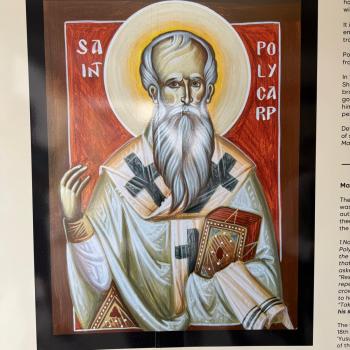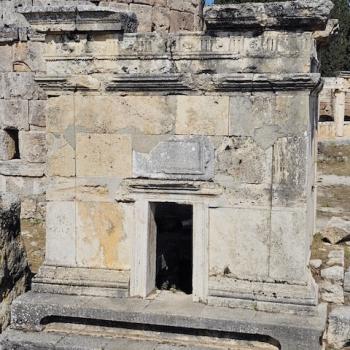BEN:Scot I really loved this chapter, and wished it had been longer. I especially enjoyed the interaction with Barth, and the stories at the end about Ms. Powers and Carl Henry. Powerful stuff. And I think you’ve made a strong case that kingdom mission has to be Christological in its core and focus etc. Who am I to disagree with that? But I would say that just as there are many dimensions to the Christology of the NT and what it affirms about Christ, so there are many dimensions to the Kingdom mission which all connect back to Christ, but not all of them necessarily focus specifically on the person of Christ. For example, a good deal of the ethical teaching in say Rom. 12-14, does not focus on our personal relationship with Jesus as Lord and Savior. It just doesn’t. It focuses on our interpersonal relationship with each other in the body, but also our relationship with the state in Rom. 13, and in all of this we are to act in ways that model Christ, please, Christ, follow his teachings etc. but those things are presupposed. They are not the focus of the teaching. Maybe you would agree with that.
On another subject, I think I’m coming around to your view of the sheep and goats parable. Certainly Paul tells us we need to do good to all, but especially to the household of faith, and why should we be surprised if Jesus said the same thing. But you will notice that the term ‘good’ used there by Paul has the same sense in both cases. That is, the good works we do towards all are not distinguished from the good works we do within the context of the family of faith. They just aren’t.
Thanks for all the good stimulation.
SCOT: Good point, Wesleyan Ben, about ergazomai agathon, esp the agathon and it is not wise to press distinction at some kind of technical level between ergazomai and poieo.
BEN: I’ve been thinking about Mt. 8 today and what is said in vs. 10-12 where the kingdom of heaven is said to contain people, but not BE people. The people are ‘in’ the kingdom of heaven, and there is also a reference to the ‘sons of the kingdom’ distinguishing kingdom from the sons, so much so that we are told that the sons can be cast out and others brought into this place or entity or condition.
SCOT: I would read that as the “place” or “land” emphasis, or perhaps even “future kingdom of God” emphasis. Again, back to my five points — and texts show emphasis or focus from one theme or another. It would be fair to say there won’t be a kingdom if no one shows up to the party!
BEN: Its one thing to say that the kingdom involves those five things. It is quite another to say the Kingdom is those five things. For example, you would be hard pressed to find any text where the term Kingdom signifies ‘the Law’. Of course yes, no party without participants, but the participants aren’t the party or the venue or the invitation etc.
SCOT: Well, Ben, I thought you were almost arguing this the other day. Rom 14 says the kingdom “is” the law’s central concerns, no?
BEN: I thought we were talking about Jesus, and what he says about these things vis a vis Mt. 8.
What I said about Romans 14 etc. is that the ethics there are indeed ethics quite specifically for God’s people in the here and now, living out Jesus’ and Paul’s teachings. It presupposes that Kingdom and its divine saving activity has come and created a community that by the power of the Spirit and with the help of that teaching can live out Kingdom values. But the Kingdom itself is not that teaching nor those values, they presuppose it. Of course when the Kingdom comes on earth fully, we will presumably not need such instruction, since we will know as we are known.
Scot do you consider your teaching at the seminary Kingdom mission? I ask because of course a seminary is not a church, nor usually is it even housed in a church, and sometimes like Asbury it’s not even connected to a specific denomination. I remember Meredith Kline at Gordon-Conwell not even wanting us to have chapel service because we were not a church, which I thought was way over the top. Given that a seminary is dealing with people already Christian (presumably) how do you view its role vis a vis the Kingdom?
SCOT: It contributes directly to the church.
We are kingdom people through and through since all are Christians (confessionally), but it is fellowship in the Body of Christ and contribution to the Universal Church because it aims entirely to the ecclesial sector.
Therefore, kingdom work.
It is our calling but to the degree that we let it become history (academically), etc, we can let it slip away from kingdom work.
But some think too much about the public sector and doing good for the City of Chicago. That’s letting our mission slip. Of course all good Scripture teaching by a Christian will lead to Christ somehow… but I’m talking about our scholarly academic folks who have decided they are historians and bracket their Christian faith to the degree that one can’t tell they are even Christians. All Scripture teaching that exegetes and expounds well is kingdom teaching.
BEN: O.K. That’s exactly what I thought you were saying.













